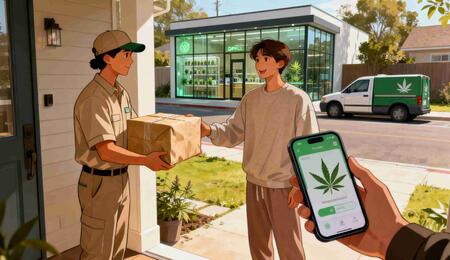From Dispensary to Doorstep: How Cannabis Delivery is Redefining Access

From years of prohibition to recent legalization, the cannabis industry has seen a dramatic evolution. Consumer demands and medical status have transformed it into a billion-dollar industry. Cannabis delivery is the latest trend in the industry, making weed purchase an app-based service with features such as product tracking and customer reviews.
From long queues in brick-and-mortar dispensaries to quick and convenient order placement, home delivery services have significantly transformed access to recreational and medical cannabis. Consumers can easily enjoy a wide selection of cannabis products from the comfort of their homes, enjoying the relaxation and buzz of CBD and THC with safety and discretion.
In this blog, Kushfly, a Los Angeles Cannabis Delivery Company explains how cannabis delivery has improved accessibility for medical patients, rural residents, and busy professionals. They also highlight the challenges, such as inconsistent policies, customer protection, and equity.
The Evolution of Legal Cannabis Access
Cannabis has an interesting history, having been cultivated for thousands of years for various medical uses. It has been recorded as a medicine in ancient China, India, and Greece. Historical records show the use of cannabis as medicine, hemp ropes, and textiles throughout the world.
Despite its medicinal properties, cannabis was prohibited in the US due to social and racial biases. In 1937, the Marijuana Tax Act criminalized all cannabis products except for highly taxed cannabis use and production. In 1970, cannabis was categorized as a Schedule I drug, making it federally illegal to harvest, sell, possess, or use in any way or form.
However, California’s legalization of medical cannabis in 1996 and Colorado’s legalization of recreational use in 2012 signaled a cultural and legal shift in the industry. This led to the legalization of marijuana in different states and countries. With societal and cultural shifts and push from the medical community, the DEA has proposed the reclassification of cannabis from Schedule I to Schedule III drug.
Licensed dispensaries were the first sign of legalization. They offered transparency, product quality, and a retail experience for cannabis products. However, they still faced barriers, including limited geographic accessibility, social stigma, and mobility issues that kept a large portion of consumers away.
With rising consumer demand for privacy, convenience, and discretion, cannabis delivery was the inevitable next step for the industry. Delivery offers privacy, comfort, and accessibility of cannabis products to consumer segments that previously did not enjoy the benefits of legalization.
The Rise of Cannabis Delivery Services
Cannabis delivery has been a game-changer for businesses in the weed industry. The combination of technology and legalization has led to the development of delivery and eCommerce platforms. People can enjoy a click-and-order experience, complete with menus, product reviews, and real-time delivery tracking.
With legalization, many regional startups started offering online shopping services with compliant systems and processes. People could enjoy the same level of convenience and efficiency as they do with food and grocery items.
The restrictions during the COVID-19 pandemic became the catalyst for boosting online sales of cannabis. Regulators eased delivery and curbside pickup of cannabis during this period, which became the norm afterwards, making cannabis delivery a preferred method of consumption.
The cannabis delivery market is now a billion-dollar industry. It is growing as more people opt for online deliveries over dispensary visits, especially medical patients and seniors. As delivery services blend convenience with compliance, they are reshaping access to cannabis.
Redefining Accessibility and Customer Experience
Delivery services have redefined customer experience by offering privacy and inclusivity. Many people avoid dispensaries due to social stigma, health conditions, or time constraints. Delivery allows people to browse, purchase, and enjoy cannabis products from the comfort of their homes, eliminating all barriers. Even people with mobility issues and social anxiety can consume cannabis without drawing attention.
Technology is personalizing the cannabis experience. New applications are offering curated recommendations based on purchase history and preferences. User-friendly interfaces allow users to enjoy the ease and sophistication of eCommerce platforms. Consumers can compare flavors, potency, customer reviews, and effects. Users can enjoy rewards, discounts, and exclusive promotions with POS-based loyalty programs.
Delivery has made cannabis products accessible for patients, seniors, and people with limited transportation. They can enjoy the therapeutic benefits without physical strain or inconvenience. Delivery has also expanded cannabis access to rural and underserved areas. These innovations have made cannabis an accessible solution for all demographics.
The Regulatory Landscape
The regulations for cannabis delivery vary by state. Some states, such as California and Massachusetts, have state-licensed deliveries, while other states have banned or restricted delivery due to safety concerns.
Even in states where cannabis is legal, compliance requirements are stringent. Delivery services must verify IDs, transport safely, and track products to meet legal standards. Many companies use tamper-proof packaging, GPS monitoring, and encrypted data systems to maintain compliance and foster customer trust.
With the rapid growth of delivery services, customer protection remains at the heart of policy formulation. It is essential to verify age, product quality, accurate labeling, and conduct thorough contamination testing. Regulators are struggling to balance customer safety with innovations. Companies are adopting compliant technologies while advocating for policy reforms. As the regulations evolve, the cannabis industry is adopting different innovations within the legal boundaries.
Economic and Social Effects
The rapid growth of the cannabis industry has welcomed several economic and social opportunities. The new ecosystem provides opportunities to drivers, logistics professionals, software developers, and local entrepreneurs. For small businesses, delivery provides an opportunity to reach a wider audience without heavy investment in real estate. Delivery also creates a level playing field for small and minority-owned businesses. It has lowered the barriers to entry and decentralized sales, empowering smaller businesses to compete with large corporations.
However, the industry still faces challenges. Large companies can monopolize the market. High delivery fees and taxes can increase prices, limiting accessibility for low-income consumers. The industry needs to create a balance between affordability, profitability, and equity to create a sustainable future.
Future of Cannabis Delivery
Many companies have started implementing AI recommendations, same-hour delivery, and drone deliveries in states with the necessary legal and technical infrastructure. Once federal restrictions ease, interstate commerce can support a robust supply chain and improved access. As cannabis delivery is slowly integrating with mainstream retail, ordering cannabis is going to become as normalized, convenient, and regulated as ordering groceries.
Sustainability and ethics are other priorities of the industry. Companies are exploring recyclable packaging and electric vehicles under their eco-friendly initiatives. Future challenges include merging speed and technology with long-term social and economic benefits.
Final Thoughts
Cannabis delivery is an important milestone in the cannabis industry’s journey. It allows businesses to offer on-demand service while prioritizing safety, choice, and accessibility. As technology, regulations, and consumer demands clash, the delivery industry is facing the challenge of balancing innovation with accessibility, responsibility, and compliance.
From dispensary counters to digital carts, cannabis delivery is making a tremendous leap in how people access wellness and recreation.



